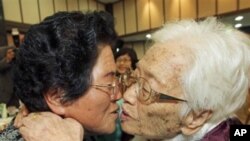More than 400 South Koreans, from nearly 100 families, are beginning a reunion in North Korea with relatives from whom they have been separated since the early 1950s. This is the first such event in more than a year.
It is a long-awaited and emotional encounter for the long-separated relatives from about 100 families.
Most of those reuniting are in their 80s, who expressed a desire to see loved ones a final time before they die.
Two batches of relatives from each side of the heavily fortified border will be reunited for three days. The second group will meet next Wednesday at the same location, the Mt. Kumgang resort.
The last reunion was held 13 months ago. They began a decade ago amid warming relations and political conciliation.
Relations chilled again between Seoul and Pyongyang after the sinking in March of a South Korean naval vessel in the Yellow Sea. An international investigation concluded the Cheonan warship exploded after being hit by a North Korean torpedo. Forty-six South Korean sailors died.
North Korea is demanding South Korea donate hundreds of thousands of tons of rice and fertilizer as a prerequisite for family reunions to resume on a regular basis.
Professor Lee Woo Young at the University of North Korean Studies in Seoul says this is a typical demand from Pyongyang.
Lee says North Korea always uses the family reunions to gain economic benefits, noting every time one is held such aid has been sent to Pyongyang. This, he says, emphasizes the fact the impoverished North requires outside assistance.
More than 20,000 South Koreans have been briefly reunited with relatives in the North since the Red Cross-organized program began.
The latest reunion went ahead despite an incident Friday afternoon along the border. Seoul says two shots were fired from North Korea at a South Korean guard post, 90 kilometers northeast of Seoul.
A Defense Ministry official here says South Korean soldiers returned three shots from a machine gun under established procedures. It is uncertain whether the initial firing by North Korea was deliberate or accidental.
The U.S.-led United Nations command, which oversees the 1953 armistice, is to investigate the incident. It will determine whether the firing violated the agreement that halted the Korean War.
The Korean peninsula has lived under the uneasy truce for nearly 60 years. During that time there has been no communication between ordinary citizens across the border.
Rare Intra-Korean Family Reunions Underway




